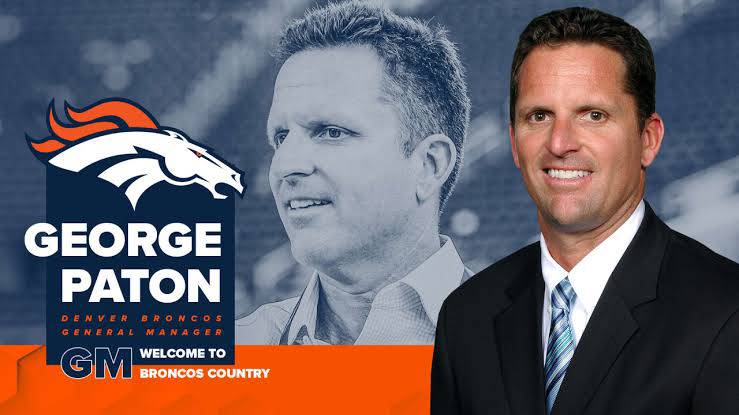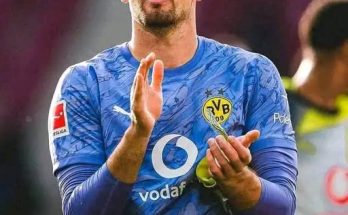George Paton, one of the most respected front-office executives in the NFL, has stepped down as the General Manager of the Denver Broncos, marking the end of a notable era in the Mile High City. His decision, announced earlier this week, comes after receiving what insiders describe as a “new and exciting opportunity” elsewhere in the National Football League—an offer too significant to pass up and one that reportedly aligns with both his professional goals and personal aspirations.
Paton’s departure comes at a critical juncture for the Broncos, a franchise that has been actively seeking stability and resurgence since its Super Bowl 50 victory under the leadership of Peyton Manning and then-head coach Gary Kubiak. Since joining the Broncos in January 2021, Paton has been the central architect behind several roster overhauls and strategic moves intended to bring the franchise back to competitiveness in a highly contested AFC West. Now, with his exit, Denver faces a pivotal moment in its long-term organizational planning and team identity.
Sources close to the situation have confirmed that Paton’s decision to resign was not a reaction to internal conflict or dissatisfaction within the Broncos organization, but rather a culmination of opportunity meeting timing. While official details about his next role have not yet been disclosed by the league, it is widely believed Paton will be taking on an executive role with greater influence at a franchise with playoff aspirations and ownership stability—two qualities that have fluctuated in Denver over the past few seasons.
During his tenure in Denver, Paton brought a quiet professionalism and diligent work ethic that earned respect not only within the team but around the league. His GM reign began during a period of transition for the Broncos, who were emerging from the shadows of the John Elway-led front office structure. Elway, once the face of the franchise both on and off the field, had stepped back from his GM duties, and Paton was tasked with reimagining the team’s football operations.
One of his first major tasks was navigating the quarterback carousel that had plagued Denver since Manning’s retirement. Paton inherited a roster that had struggled to find consistent play under center, with names like Trevor Siemian, Drew Lock, Joe Flacco, and Teddy Bridgewater cycling through without long-term success. The biggest swing Paton took was orchestrating the blockbuster trade for Russell Wilson, a move that sent shockwaves through the league in 2022 and signaled Denver’s intent to return to relevance.
While the Wilson trade initially brought renewed optimism, the outcome has been mixed at best. The first season under Wilson, combined with rookie head coach Nathaniel Hackett, was marred by offensive inefficiency, miscommunication, and underperformance. The Broncos finished the 2022 season at 5-12, leading to Hackett’s dismissal before the season concluded. Though Paton took responsibility for the hire, he remained adamant that the team’s long-term direction was sound.
In 2023, Paton collaborated closely with new ownership under the Walton-Penner Family Ownership Group and played a key role in bringing in Super Bowl-winning head coach Sean Payton. The move was seen as a decisive and costly one, requiring significant draft capital to lure Payton away from his post-retirement status with the New Orleans Saints. Though the results under Payton were improved, they still fell short of playoff contention, further underscoring the difficulty of rebuilding a once-proud franchise.
Beyond quarterback issues and coaching hires, Paton’s tenure included several strong moves in the draft and free agency. He displayed a sharp eye for talent, most notably selecting cornerback Patrick Surtain II in the first round of the 2021 NFL Draft. Surtain has since emerged as one of the top young defensive backs in the league and a cornerstone of Denver’s defense. Paton also helped stabilize the Broncos’ roster with savvy mid-round selections and smart contract negotiations, particularly on defense, where Denver remained a top-10 unit during much of his time.
Paton’s player-first approach and reputation for fairness were widely recognized. Players often spoke about his integrity and communication style, traits that helped foster a culture of professionalism in the locker room. Though the win-loss column did not always reflect the strides made internally, many within the organization credit Paton with laying the groundwork for sustained success.
However, the NFL is ultimately a results-driven business. Three consecutive losing seasons and an ongoing playoff drought have fueled frustration among the fanbase and heightened scrutiny from media outlets. With the arrival of an ambitious ownership group and a head coach like Sean Payton—who comes with a proven track record and a strong voice in personnel decisions—the organizational dynamics were shifting. While there was no public tension, it became increasingly clear that a realignment of roles and responsibilities was imminent.
Paton’s departure, according to multiple sources, was handled with class and mutual respect. He informed ownership of his decision well in advance and worked collaboratively to ensure a smooth transition. In a statement released by the Broncos, Paton thanked the organization, the fanbase, and the city of Denver for their support and expressed pride in the progress made during his tenure. “This decision was not made lightly,” the statement read. “But after careful consideration, I believe this new opportunity aligns perfectly with where I am in my career and my life. I will always be grateful to the Denver Broncos and the people who welcomed me and worked tirelessly beside me these past few years.”
Team CEO Greg Penner praised Paton’s professionalism and contributions to the franchise. “George brought tremendous leadership, diligence, and integrity to our organization. His commitment to building a strong foundation will serve the Broncos well into the future,” Penner said. “We wish him the very best in his next chapter and thank him for his many contributions.”
As the Broncos begin their search for a new general manager—or possibly reimagine their front-office structure entirely—the future direction of the team hangs in the balance. With Sean Payton expected to have increased input on personnel matters, the next GM may function more as a collaborative partner than a traditional top-down decision-maker. Names already circulating in league circles include experienced assistant general managers and rising stars from organizations like the 49ers, Ravens, and Eagles—teams known for their scouting and development acumen.
Meanwhile, speculation is rampant about where Paton is heading next. While he has not revealed the destination, several league insiders suggest it may be a franchise with recent playoff appearances, a strong front office, and a desire to elevate its executive leadership. Some have pointed to organizations like the Chicago Bears, where a restructuring of football operations could create a new executive layer, or the Washington Commanders, who are in the midst of a cultural and competitive reboot under new ownership.
Regardless of where he lands, Paton’s NFL reputation remains intact. Prior to his time in Denver, he spent over a decade with the Minnesota Vikings, where he served as the right hand of GM Rick Spielman and helped construct rosters that were routinely competitive and well-managed under the salary cap. His methodical approach to scouting, negotiation, and team-building has long made him a respected figure in league circles. For Paton, this next opportunity represents both a fresh challenge and a vote of confidence in his ability to lead at the highest level.
For the Broncos, the next few months will be crucial. The 2025 NFL Draft looms large, free agency decisions will begin to take shape in the fall, and the pressure to win continues to mount. Ownership has expressed a desire to create a long-term vision that combines front-office expertise with coaching stability. Whether that means hiring a traditional GM, a president of football operations, or some hybrid role remains to be seen.
The Broncos fanbase, one of the most passionate and loyal in the league, will now look to leadership to guide the next phase of the team’s rebuild. Despite the recent years of disappointment, the pieces for a rebound are present. With a stable ownership group, a championship-caliber head coach, and key young talents on both sides of the ball, the foundation that Paton helped build may still deliver the success he envisioned when he took the job in 2021.
As George Paton walks away from his role in Denver, he does so with the respect of peers, the admiration of players, and a legacy that—while incomplete—set a tone of professionalism and structure that could yet prove foundational to future success. His next chapter may very well define his career, but in Denver, he leaves behind a footprint that won’t be forgotten anytime soon.



